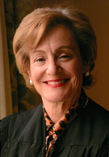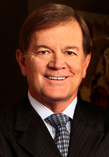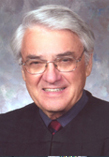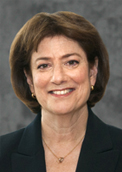© 2017 The Texas Lawbook.
By Mark Curriden
(Feb. 20) – This week, hundreds of North Texans report to the Earl Cabell Federal Building to jury service in the public corruption trial of influential Dallas County Commissioner John Wiley Price and his long-time assistant, Dapheny Fain.

Federal prosecutors claim Price sold his vote in return for about $900,000 in cash and gifts from businesses. Defense attorneys say their client is innocent. An estimated 170 witnesses will testify. About 2,000 pieces of evidence are expected to be introduced.
The trial is considered one of the most important and controversial of a governmental official in Dallas history. Race, religion and politics are significant factors.
While legal experts say that high-profile cases like this one can get out of control and become a media circus, they agree that there is no chance that will happen in the Price trial.
Why?
U.S. Chief District Judge Barbara Lynn.
“This trial has all the elements of a case that could turn into a circus and go on and on for nine months,” said Randy Johnston, a legal ethics expert at Johnston Tobey Baruch in Dallas. “There are a few judges who could keep this trial from getting out of control, but none of them could do it with more grace and dignity.

Widely recognized as one of the premier federal judges in the U.S., Judge Lynn is also viewed as a leader in the legal profession. Appointed to the federal bench in 1999 by Pres. Bill Clinton and confirmed by a voice vote in the U.S. Senate, she is the only lawyer to ever chair both the American Bar Association’s Litigation and Judicial Sections.
Judge Lynn has presided over some of the most controversial and important trials in North Texas during the past 15 years, including the 2009 criminal prosecution of Dallas Mayor Pro Tem Don Hill and the Hosam Maher Husein Smadi terrorism case.
In sentencing Hill to 18 years in prison for bribery and money laundering, Judge Lynn said his corruption was a “betrayal to the city.”
The National Law Journal named her one of the most influential lawyers in the country.
Prosecutors and defense lawyers agree on very little about the facts of the Price case, but both sides concur that Judge Lynn is as “close to perfect” as a federal trial judge can be in her ability to handle such a high-profile, politically delicate and racially sensitive case.
Legal experts say that Judge Lynn’s style allows lawyers for both sides enough freedom to effectively represent their clients, while she also maintains strict control of her courtroom. Attorneys who appear before Judge Lynn say she is fiercely independent and guards jealously against any bias seeping into her trials.
“She has the proverbial iron fist and velvet glove,” Johnston said. “It would be a huge mistake for either side to ignore her instructions.”
Even fellow jurists sing her praises.
“I don’t think there’s any doubt that Barbara is one of the five best federal judges in the country,” Judge Patrick Higginbotham, who sits on the U.S. Court of Appeals for the Fifth Circuit, said in an interview with The Texas Lawbook. “Barbara has always been a star, even when she was in law school and later as a trial lawyer and judge.”

Born Barbara Golden, she was in the first class of women admitted into the undergraduate program at the University of Virginia in 1970. While there, she met Mike Lynn, a fellow UVA student.
Their relationship solidified when Golden tried to join the two-century-old Jefferson Literary and Debate Society, which had never admitted a woman before, but she was rejected. Woodrow Wilson and Edgar Allan Poe were members.
One weekend, those opposed to admitting women into the Jeff Society were in New Orleans to celebrate Mardi Gras. Lynn, who was a Jeff Society member, called for a surprise vote to admit Golden. She was elected as a member by a single vote.
The duo attended SMU Dedman School of Law, where they were on the mock trial team with Rusty Hardin. As her law school days wound down, Lynn and her fellow women classmates noticed that they were receiving very few offers from large Dallas law firms.
“We had this crazy idea that if we worked hard, did well in law school and demonstrated our skills, that we would get job offers,” Judge Lynn told The Texas Lawbook in an interview in 2015. “We noticed that men who graduated well below several of the women in our class were getting offers while those same law firms were ignoring the female law students.
“One law firm refused to extend me an offer because of my supposed strong connections to New York, even though I had not lived in New York since I was four years old,” she says.
Lynn and her classmates formed a student group at SMU and sued a half-dozen major law firms. Nearly every law firm settled instead of going to trial. And even though the one case that did go to trial was unsuccessful, most law firms in Dallas quickly changed their hiring policies.
“There was definitely fallout from Barb taking this very public stand,” says Mike Lynn. “We were never going to receive offers from any of those law firms that were targeted. But we did okay.”
Akin Gump hired Mike Lynn, who has now headed his own litigation boutique for more than two decades. Carrington Coleman extended a job offer to Barbara Lynn in 1976, making her the first woman lawyer at the firm. Seven years later, she became its first woman partner.
“We had a firm policy to never hire students right out of law school,” says Jim Coleman, one of the firm’s founders. “But once we saw Barbara’s resume and once we met and interviewed her, we eliminated that policy. And it was one of the best decisions we ever made.”
As a young lawyer, Judge Lynn’s career blossomed. She defended large corporations being sued for employment and labor matters. Every once in a while she represented plaintiffs.
In 1988, she represented Fireman’s Fund Insurance Company in a business contract dispute against Irving Savings Association, whose corporate officers were convicted of criminal offenses.
The court awarded her client $7 million in damages. The case was also significant because it was one of the first times that a court admitted as evidence the criminal convictions of the defendants as a means of proving the alleged underlying facts.
In the fall of 1999, she was appointed to the federal bench, assuming the courtroom of legendary federal judge Harry Barefoot Sanders. In May 2016, she became the first woman to be the chief judge of the Northern District of Texas.
During the past 17 years, the Dallas Bar Association has consistently rated Judge Lynn as one of the fairest and most knowledgeable judges in North Texas.
Legal experts point to a 2011 opinion she delivered in a potential securities class action lawsuit brought against Halliburton as evidence of Judge Lynn’s brilliance and influence.
In her decision, Judge Lynn ruled that Fifth Circuit precedent required that she decide for Halliburton, but she made it clear that she didn’t like it and believed that the Fifth Circuit made it too difficult for plaintiffs in these kinds of cases to achieve class action status.
“This was a great opinion because Judge Lynn followed the law as set by the Fifth Circuit, but she also noted how she thought that precedent was wrong or at least too burdensome on plaintiffs,” Nina Cortell, an appellate law expert at Haynes and Boone in Dallas, told The Texas Lawbook in 2015.

Two years later, the U.S. Supreme Court reversed the Halliburton case, citing Judge Lynn’s opinion as its guide in ruling for the plaintiffs and striking down the more burdensome Fifth Circuit precedent.
“The Halliburton case demonstrates that Judge Lynn is certainly brilliant and that she follows precedent, even if she disagrees with it, but that she also possesses great common sense and is able to convincingly share that common sense with her colleagues on higher courts,” says Cortell.
Any lawyer who has a case before Judge Lynn needs to know her biggest complaint against lawyers: misspellings and grammatical errors fill two-thirds of the motions and briefs that come to her.
“I’ve seen lawyers get their own client’s name wrong and some have even misspelled my name,” she says. “If I’m the judge in your case, know that you need to proofread your briefs and know that not only do these mistakes upset me, they cause me to not trust you on other things.
“Lawyers tell me that these mistakes should not perturb me, but that doesn’t change the fact that they do,” she says.
© 2017 The Texas Lawbook. Content of The Texas Lawbook is controlled and protected by specific licensing agreements with our subscribers and under federal copyright laws. Any distribution of this content without the consent of The Texas Lawbook is prohibited.
If you see any inaccuracy in any article in The Texas Lawbook, please contact us. Our goal is content that is 100% true and accurate. Thank you.
